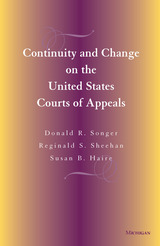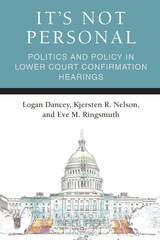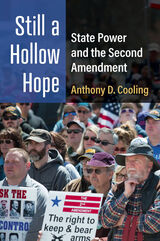
The authors present the first comprehensive examination of the shifting role of the Courts of Appeals, investigating changes over time and presenting the first systematic analyses of those changes. Their work is the first book to utilize the database of the U.S. Courts of Appeals, analyzing over 15,000 cases to examine trends between 1925 and 1988. The book answers questions such as who are the judges? What are their decisional tendencies? What has been the role of region and partisan politics? Who are the litigants? And who has won and who has lost throughout the twentieth century? It is the only current, up-to-date book on the Courts of Appeals and an essential read for all scholars and students interested in American politics and judicial behavior.
Donald R. Songer is Professor of Political Science, University of South Carolina. Reginald S. Sheehan is Associate Professor of Political Science and Director of the Program for Law and Juridical Politics, Michigan State University. Susan B. Haire is Assistant Professor of Political Science, University of Georgia

Cohen theorizes that, like large corporations, the courts must overcome the critical tension between the autonomy of the judges and their interdependence and coordination. However, unlike corporations, courts lack a central office to coordinate the balance between independence and interdependence. Cohen investigates how courts have dealt with this tension by examining topics such as the role of law clerks, methods of communication between judges, the effect of a court's size and geographic location, the role of argumentation, the use of visiting judges, the significance of the increasing use of unpublished decisions, and the nature and role of court culture.
Inside Appellate Courts offers the first comprehensive organizational study of the appellate judicial process. It will be of interest to the social scientist studying organizations, the sociology of law, and comparative dispute resolution and have a wide appeal to the legal audience, especially practicing lawyers, legal scholars, and judges.
Jonathan M. Cohen is Attorney at Gilbert, Heintz, and Randolph LLP.

In order to be confirmed to a lifetime appointment on the federal bench, all district and circuit court nominees must appear before the Senate Judiciary Committee for a confirmation hearing. Despite their relatively low profile, these lower court judges make up 99 percent of permanent federal judgeships and decide cases that relate to a wide variety of policy areas. To uncover why senators hold confirmation hearings for lower federal court nominees and the value of these proceedings more generally, the authors analyzed transcripts for all district and circuit court confirmation hearings between 1993 and 2012, the largest systematic analysis of lower court confirmation hearings to date. The book finds that the time-consuming practice of confirmation hearings for district and circuit court nominees provides an important venue for senators to advocate on behalf of their policy preferences and bolster their chances of being re-elected. The wide variation in lower court nominees’ experiences before the Judiciary Committee exists because senators pursue these goals in different ways, depending on the level of controversy surrounding a nominee. Ultimately, the findings inform a (re)assessment of the role hearings play in ensuring quality judges, providing advice and consent, and advancing the democratic values of transparency and accountability.

Go ahead and try to make a federal case of it. That may seem to be your right, but as Larry Yackle reveals in Reclaiming the Federal Courts, the guardians of that right don’t see it that way. A systematic study of the role the federal courts play in enforcing the Constitution, this powerful book shows how the current conservative Supreme Court has undermined that role by restricting citizens’ access to these courts.
Yackle focuses on judicially created doctrines that channel certain cases away from the federal courts (which tend to hold government power in check) and into state courts (which tend to allow government a relatively free hand). In doing so, he clearly shows how seemingly arcane and confusing legal technicalities actually tilt the delicate balance between government power and individual liberty in the United States. As he traces the historical underpinnings of the federal judicial system, Yackle explains how access to the federal courts in federal-question cases is intertwined with the most fundamental elements of American Jurisprudence—Legal Formalism, Legal Realism, Legal Process, and the Civil Rights Movement—as well as with the recent conservative retrenchment. He goes on to examine specific modern doctrines. Here we see how the Rehnquist Court’s restrictive rules deny citizens standing to sue in federal court, disclaim the federal courts’ jurisdiction even when standing is conceded, channel cases away from the federal courts even when they have jurisdiction, and frustrate the right to petition the federal courts for a writ of habeas corpus—perhaps the most fundamental right of any citizen.
Yackle’s straightforward style makes his description and analysis of existing law intelligible to students and others who wish to understand how the federal judicial system actually functions—or fails to function. The book concludes with concrete recommendations for congressional action to correct the subtle but significant injustice that Yackle so clearly and cogently exposes.

The U.S. Supreme Court increasingly matters in American political life when those across the political spectrum look at the Court for relief from policies they oppose and as another venue for advancing their own policy agendas. However, the evidence is mounting, to include this book in a big way, that courts are more of a sideshow to the culture war. While court decisions, especially Supreme Court decisions, do have importance, the decisions emanating from the Court reflect social, cultural, and political change that occurred long prior to their decision ever being made.
This book tests how much political and social change has been made primarily through Gerald Rosenberg’s framework from his seminal work, The Hollow Hope: Can Courts Bring About Social Change, but it also utilizes Daniel Elazar’s Political Culture Theory to explain state level variations in political and social change. The findings indicate that while courts are not powerless institutions, reformers will not have success unless supported by the public and the elected branches, and most specifically, that preexisting state culture is a determining factor in the amount of change courts make. In short, federalism still matters.
READERS
Browse our collection.
PUBLISHERS
See BiblioVault's publisher services.
STUDENT SERVICES
Files for college accessibility offices.
UChicago Accessibility Resources
home | accessibility | search | about | contact us
BiblioVault ® 2001 - 2024
The University of Chicago Press









